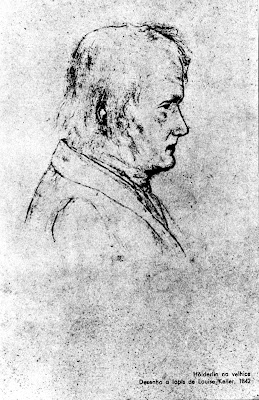Tübingen, Janner (4) _ "Pallaksch, Pallaksch”_ Silke-Maria Weineck
Back to one of my obsessions ...


Emil Klein (1886)
Silke- Maria Weineck in the article "Logos and Pallaksch. The Loss of Madness and the Survival of Poetry in Paul Celan’s 'Tubingen, Janner' "[...] traces the movement of de-and remystification in Celan’s poem, Tübingen, Janner, a poem retelling the tales of madness that surround Holderlin," as she declared.
(...)
Celan’s poem is a poem that speaks of Holderlin as well as of his madness; it speaks of the danger of this specific legend, of the veil it draws over Holderlin’s words. It is a meditation both on madness and on a specific gaze on madness, a poem on reading and blindness, and, lastly, not on the power of madness over poetry, but of poetry over madness.
(...) and it closes with mad Holderlin’s sunken word:
“Pallaksch”* - or almost closes, for its last mark is a closing bracket. It is also, with equal force, a poem touching on madness. Its imagery is hallucinatory -swimming towers, visits of drowned carpenters, lightbeards. It is inhabited by voices and figures - by many more voices and shapes than appear on its surface, as the many excellent readings of this poem have shown. It moves from what has been conveniently called “hermetic” imagery towards stuttering, stammering, and babble. It quotes, as I will explain, two mad words, “immerzu” and “pallaksch.” Without doubt, madness is its most clearly drawn frame of reference, but it is not one single madness that is at stake here.
It is not only the title that layers meaning over meaning; a comparable exegesis could probably be given for every single line. There is a multiple memory written into this poem, memories of madnesses of radically different kinds. This condensation of various historical references could itself be read as a mad loss of location, a temporal disorientation, a loss of associative control. On the other hand, multiple evocation is, of course, a poetic prerogative, not mad by itself, and while the ancient association of poetry and madness may be partially grounded precisely in such parallel discursive practices, the multiple disorientations of Celans poem, for me, evoke an imposing poetic control rather than its loss. This poetic control in the face of madness, is, central to the poem. “Immer-, immer-/zuzu.” Towards what does the stammering language move? The next line after “zuzu” is blank (and the blankness of verse-breaks is never accidental in Celan’s poetry, never a mere convention). Towards silence, then? An openness towards nothingness? Not quite, for there is a remainder, even though this remainder of speech is triply qualified: “pallaksch” is not only a non-word, it is also not the poem’s word, but a quote from one who stopped speaking, from after poetry; it is doubled; lastly, the madman’s quoted nonword appears in brackets.
The pallaksch, as it appears in Tiibingen, Janner, repeats the gesture of opening and closing on another level. For while it does not mean anything, by itself, the nonword pallaksch which invades poetry (as madness, perhaps, invaded Holderlin’s poetic life) is also something of a biographical watchword, signalling to Holderlin readers that it is the late, the mad Holderlin who is at stake here, the Holderlin who, as his friend Schwab reported, refused If a human came - and the “if” implicit in the German subjunctive is repeated three times -, if a human came, and if he were of a certain quality, a quality associated with enlightened, prophetic, potentially biblical speech, with the “light beard of the patriarchs” - he would not be able, or allowed, to speak at all, he “might only babble.” Perpetually: “immer-,immer-/zuzu.” Here, the babbling, the lullen, already invades the poem. The “perpetually” of inzmerzu falls apart, into “immer-, immer-” and “zuzu.” A babbled word, a nonword. Also, in the repetition of “zu,” a doubling of closure - for “zu” means “shut” - and, at the same time, a negation of closure - for “zu” also means “towards.” It is this simultaneity of opening and closing that strikes me as most significant in this poem’s advance towards the madness implicit in its last word, pallaksch. The “immerzu” already is a mad word, and, like “pallaksch,” a quotation, although, unlike “pallaksch,” a silent one. It stems from Georg Buchner’s play Woyzeck, and Celan, in his Büchner-Preisrede, refers to “immerzu” as Woyzeck’s “Wahnsinnswort” (“word of madness”).
Woyzeck is haunted by it while he contemplates the murder of his fiancée Marie. Woyzeck’s hallucination itself is, again, a quotation: he overheard it when Marie cheered on her dance partner, “immer zu, immer zu,” - “faster,” “don’t stop,” “go on, go on!” Thus, “immerzu” enters Celan’s poem doubly mutated, as a memory of a memory, an allusion to an allusion, changing from innocuous flirtation to a murderous urge to the perpetuity of a broken language. In drawing Woyzeck’s Wahnsinnswort into the poem, Celan does not only strengthen the poem’s movement towards madness, he also obliquely refers to his famous Preisrede that centres on poetry’s movement towards silence. [...]
Silke-Maria Weineck,"Logos and Pallaksch. The Loss of Madness and the Survival of Poetry in Paul Celan’s 'Tubingen, Janner",Orhis Litterarum 54, (University of Michigan, Ann Arbor,1999),262-278.


Comentários